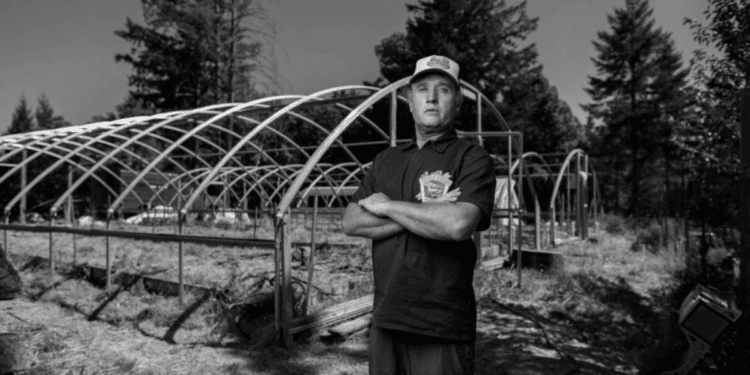Press release from Institute for Justice
In 2018, after a wildfire destroyed their Southern California home, Corrine and Doug Thomas did their best to find a silver lining and turn that nightmare into a dream: They packed up their remaining possessions, and—along with one of their two autistic adult sons—bought a modest home nestled in Northern California’s fabled redwood forests. The home, which is perched on a hill over the Avenue of the Giants highway in Humboldt County, was a perfect fit for their family and included a large barn out back for Doug’s workshop.
Unfortunately, the Thomases’ dream quickly turned into a terrible new nightmare.
Just six days after moving in, they received a notice from the county fining them $12,000 per day because the previous owners had used the barn to grow cannabis over two years before the Thomases bought it. The county, which requires a lengthy permit process for demolitions, gave them just ten days to tear it down. Panicked, they hired a building engineer, who estimated that the demolition would cost more than $180,000—which was money they don’t have. As of today, they have accrued more than $1 million in fines.
By the county’s reasoning, anyone with a greenhouse, cleared garden, barn or any other structure that could be used to grow cannabis is assumed to be growing cannabis and fined at least $10,000 per day. Humboldt accuses property owners of cannabis-related offenses without any proof or process. The county rarely bothers to conduct even the most cursory investigation. If the inspector had visited the Thomases’, for instance, he would have found an empty barn with a few tools. But Humboldt’s inspectors have admitted that they frequently rely on satellite images alone to issue fines.
The Thomases, like more than 1,200 other Humboldt property owners, are victims of the county’s so-called “abatement” program, which levies crippling fines based on unfounded, scattershot allegations that property owners are growing cannabis without paying the county for a permit. Once fined, owners face a legal labyrinth to prove their innocence. In the Thomases’ case, for instance, they’ve waited more than a year for the county to schedule a simple hearing to plead their case. Even as the Thomases waited for a hearing, the daily fines continued to accrue.
That is why the Thomases—along with a group of other Humboldt property owners—have partnered with the Institute for Justice (IJ) to file a class-action lawsuit to put an end to the county’s unconstitutional practice of levying outrageous fines against innocent individuals.
“Humboldt is fining innocent homeowners millions of dollars for crimes they didn’t commit,” said Jared McClain, an attorney at the Institute for Justice. “The Constitution guarantees that everyone is innocent until proven guilty. But in Humboldt County, inspectors have turned that principle on its head and are fining innocent homeowners based on crimes the county has no proof of and hasn’t even bothered to investigate.”
Like the Thomases, Blu Graham knows the pain of Humboldt’s abusive abatement program firsthand. Blu, who is also part of the lawsuit, is a backcountry guide and volunteer firefighter. He and his wife own a local restaurant in Shelter Cove, California, which is known for its homemade hot sauces. They were having a hard time getting the exotic peppers locally, so Blu decided to build two rudimentary greenhouses and started to grow them himself.
When the county inspector was reviewing satellite images, he saw Blu’s new greenhouses, assumed they had to be for cannabis cultivation, and gave Blu ten days to remove them, along with a rainwater-catchment pond he’d built for fire safety, or face $10,000 daily fines. Incensed, Blu drove into Eureka to appeal the fine, where county officials insisted they knew he was “not just growing asparagus.” With nearly $1 million in fines hanging over his head, Blu waited more than four years for a hearing, which the county mysteriously scheduled just before Blu filed this suit.
“If the county inspector had asked to swing by, I would have been happy to show him inside my greenhouses. I’ve got nothing to hide. It was just a bunch of peppers,” said Blu. “But instead, I had to wait years for a hearing. The County eventually gave up on pretending they had proof I grew marijuana but wouldn’t give me a permit for my house unless I settled.”
The lawsuit, which represents the interests of all Humboldt property owners still subjected to the county’s abusive abatement procedures, argues that fining property owners for crimes they did not commit, without even a cursory investigation, is a clear violation of their constitutional right to due process. Furthermore, it argues that $10,000 daily fines for permitting violations are unconstitutionally excessive and that owners have a right to have a jury decide whether they really violated the code to grow cannabis illegally.
“In many ways, the process of contesting the county’s bogus fines is punishment in and of itself,” said IJ Senior Attorney Robert Johnson. “Humboldt has made it nearly impossible to fight these fines in court. Homeowners have had to wait years, just to start the process of fighting back. And the county continues to assess daily fines even while homeowners wait for a hearing. There’s no way out unless the county gets paid. We’re confident the courts will see this for what it is: an unconstitutional program designed to punish innocent homeowners who have done nothing wrong.”










Dome, Convention Center are the opposite of ‘regional assets’